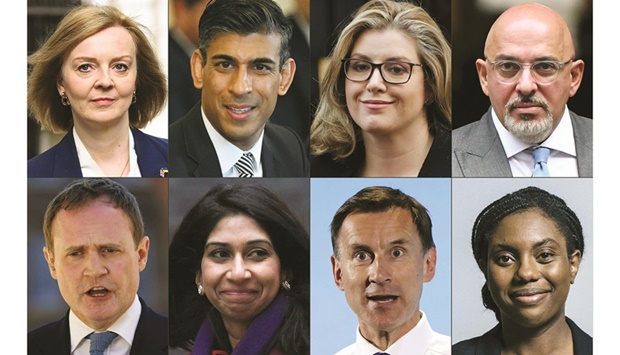Eight Conservatives will fight it out to succeed Boris Johnson as party leader and British prime minister after winning enough nominations from their colleagues to go through to the first round of voting today.
Johnson is staying on in Downing Street as prime minister until the internal party contest finds his successor.
Only two hopefuls failed to win the 20 necessary nominations, leaving a wide field of candidates seeking to win the backing of the party with promises of tax cuts, honesty and serious government, in a contrast to Johnson who was forced to announce he would resign after a series of scandals.
Those failing to get 30 votes in today’s vote will be eliminated.
Former finance minister Rishi Sunak is the bookmakers’ favourite, and among those he will be taking on are his successor Nadhim Zahawi and the foreign minister, Liz Truss, in what is becoming an increasingly testy and divisive contest.
Sunak, 42, and health minister Sajid Javid quit last week in protest at Johnson’s scandal-hit administration, setting off a wave of government resignations that forced him to step down as Conservative leader.
The next British leader faces a daunting in-tray while support for the Conservatives is also falling, polls show.
Britain’s economy is facing rocketing inflation, high debt, and low growth, with people grapple with the tightest squeeze on their finances in decades, all set against a backdrop of an energy crunch exacerbated by the war in Ukraine which has sent fuel prices soaring.
As the contest heated up, rival campaigns stepped up private criticism of each other and pointed to either financial or other questions hanging over their opponents.
Sunak kicked off his campaign by portraying himself as the serious candidate, promising “grown up” honesty “not fairy tales”, seeking to contrast himself with the extensive tax cuts pledged by most of the other candidates.
“It is not credible to promise lots more spending and lower taxes,” Sunak said, adding that tax cuts could only come after soaring inflation was tackled.
As finance minister, Sunak set Britain on course to have its biggest tax burden since the 1950s, and most of the other hopefuls have turned their fire on him by saying they would oversee cuts immediately.
The former finance minister has the widest support among colleagues who have publicly expressed their view.
Sunak has refused to distance himself from Johnson’s administration, in which he played a key role supporting businesses and workers during the coronavirus (Covid-19) pandemic.
He called Johnson “one of the most remarkable people I’ve met”.
“Whatever some commentators may say, he has a good heart,” he told cheering supporters, after one Johnson ally accused Sunak of being a treacherous “snake”.
“I will have no part in a rewriting of history that seeks to demonise Boris, exaggerate his faults or deny his efforts,” he added.
Penny Mordaunt, a junior trade minister who is also heavily tipped, topped a poll of Conservative members on Monday and she too has tried to strike a more measured tone on tax, saying that while she would cut taxes: “I will pioneer sound money.”
“I am a small state, low tax conservative, but I also believe we need to use the levers of government to support jobs and livelihoods through difficult economic situations,” she wrote in the Daily Telegraph newspaper.
Attorney-General Suella Braverman, the former health minister Jeremy Hunt, Tom Tugendhat, the chair of the foreign affairs committee, and Kemi Badenoch, a former junior minister who is scooping up support on the right-wing of the party, were among other candidates to enter the first round of the contest.
Foreign Secretary Truss received the backing yesterday of two ministers closest to Johnson – Nadine Dorries and Jacob Rees-Mogg – who have both been critical of Sunak.
Home Secretary Priti Patel – who like Truss is a favourite of the Tory right – was rumoured to be about to join the fray but ruled out a bid.
After days of sniping among leading contenders, Patel expressed hope “the contest will be conducted in a good spirit that brings our party together”.
The 1922 Committee of Conservative members of parliament, which is organising the contest, says the field will soon be whittled down with repeated votes in coming weeks, with the final two then selected by the fewer than 200,000 members by July 21.
The winner, and Britain’s new prime minister, will be announced on September 5.
Meanwhile the opposition Labour Party said the government had blocked its attempt to call a confidence vote in Johnson today to force him from office immediately.
The government said that it would allow Labour to call a confidence vote if the wording of the motion was changed to remove reference to Johnson.
Labour leader Keir Starmer had said that by their actions last week, the Tories had “concluded that the prime minister is unfit for office”.
Labour wanted the vote for today, but the Daily Telegraph reported that the government has refused time to debate the motion.
“As the prime minister has already resigned and a leadership process is underway, we do not feel this is a valuable use of parliamentary time,” the paper cited a government source as saying. “Should Labour amend their motion appropriately, they can have the next business day for it to be debated.”

This combination of pictures shows (top row from left), Britain’s Foreign Secretary Liz Truss, former Chancellor of the Exchequer Rishi Sunak, International Development Secretary and Minister for Women and Equalities Penny Mordaunt, Education Secretary Nadhim Zahawi, (bottom row from left) Conservative politician Tom Tugendhat, Attorney-General Suella Braverman, Conservative MP and leadership contender Jeremy Hunt, and an undated handout photograph released by the UK Parliament of Conservative MP for Saffron Walden, Kemi Badenoch.
